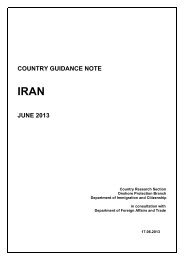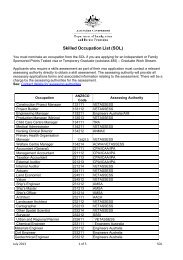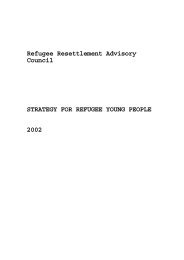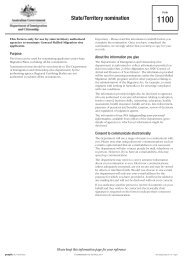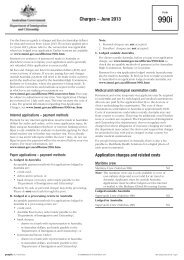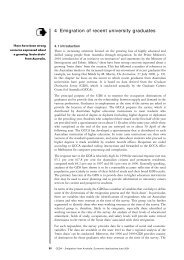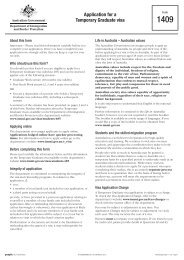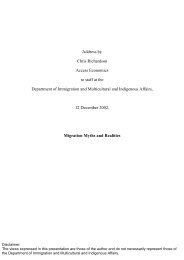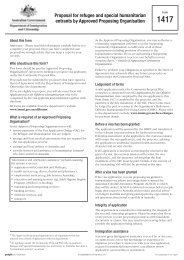Evaluation of the Integrated Humanitarian Settlement Strategy (IHSS)
Evaluation of the Integrated Humanitarian Settlement Strategy (IHSS)
Evaluation of the Integrated Humanitarian Settlement Strategy (IHSS)
Create successful ePaper yourself
Turn your PDF publications into a flip-book with our unique Google optimized e-Paper software.
However, as with all volunteers under <strong>the</strong> <strong>IHSS</strong>, <strong>the</strong>re is a need for a clear definition <strong>of</strong> <strong>the</strong> roles,<br />
responsibilities, accountabilities and expectations if <strong>the</strong>ir contribution is to be meaningful. Fur<strong>the</strong>r,<br />
volunteers should not be used in lieu <strong>of</strong> paid workers.<br />
The transition to <strong>the</strong> <strong>IHSS</strong> has left a number <strong>of</strong> volunteers ‘out in <strong>the</strong> cold’ for a range <strong>of</strong> reasons,<br />
including concerns about levels <strong>of</strong> pr<strong>of</strong>essionalism, quality control, capacity to resource volunteer<br />
management and contractual limitations. Volunteer involvement appears to be crucial to <strong>the</strong> success<br />
<strong>of</strong> <strong>IHSS</strong>. In many instances, service providers acknowledged that <strong>the</strong>y could not deliver services<br />
without <strong>the</strong>ir assistance, while in o<strong>the</strong>rs, service providers do not involve volunteers and experience<br />
considerable difficulties making <strong>the</strong>ir resources stretch to fulfil <strong>the</strong>ir contracts.<br />
CSR was developed in response to this, but it has not as yet successfully ‘captured’ <strong>the</strong> full contingent<br />
<strong>of</strong> volunteers. While <strong>the</strong>re is significant participation by volunteers in many localities – and in a<br />
number <strong>of</strong> instances <strong>IHSS</strong> works only because <strong>of</strong> <strong>the</strong> input <strong>of</strong> volunteers – <strong>the</strong>y <strong>of</strong>ten operate outside<br />
CSR. In part <strong>the</strong> problems can be traced to <strong>the</strong> CSR Coordination and Support service not yet<br />
functioning as expected, as pr<strong>of</strong>essional development around volunteer involvement has not<br />
transpired. As well, <strong>the</strong>re is a lack <strong>of</strong> incentive for volunteers to operate under CSR when <strong>the</strong>y can<br />
continue, as <strong>the</strong>y have historically done, to operate outside <strong>the</strong> service.<br />
As noted previously, some former CRSS groups have not adjusted well to <strong>the</strong> change and inevitably<br />
will become redundant. O<strong>the</strong>r challenges faced by <strong>the</strong> CSR service include ensuring that <strong>the</strong>re are<br />
appropriate linkages with <strong>the</strong> o<strong>the</strong>r <strong>IHSS</strong> services, particularly <strong>the</strong> IIOA and PS providers, if <strong>the</strong>y are<br />
to play an active and meaningful role in <strong>the</strong> settlement process. If this does not occur it is likely that<br />
<strong>the</strong> CSR service will become a parallel service, operating in isolation and finding it increasingly<br />
difficult to maintain a meaningful relationship with <strong>the</strong>ir clients.<br />
Recommendation 18<br />
Community Support for Refugees<br />
DIMIA should continue to monitor <strong>the</strong> development <strong>of</strong> <strong>the</strong> CSR network and this should be undertaken<br />
with an awareness that a large proportion <strong>of</strong> volunteers currently operates independently <strong>of</strong> CSR.<br />
Ways to streng<strong>the</strong>n relationships with providers should be explored.<br />
5.7 Service Support Provider<br />
5.7.1 Service description<br />
The SSP service is aimed at ensuring that:<br />
<strong>IHSS</strong> service providers are equipped to meet <strong>the</strong> service needs <strong>of</strong> <strong>Humanitarian</strong> Program<br />
entrants in <strong>the</strong> initial stages <strong>of</strong> settlement, and <strong>the</strong>ir obligations as contracted service providers,<br />
employers, and partners where relevant<br />
entrants’ settlement is enhanced by expanding <strong>the</strong> capacity <strong>of</strong> <strong>the</strong> voluntary sector to deliver<br />
services by being responsible for <strong>the</strong> recruitment, coordination and registration process <strong>of</strong> CSR<br />
groups, through <strong>the</strong> establishment <strong>of</strong> a CSR contact in each State/Territory and by providing<br />
training and support to CSR groups.<br />
59<br />
<strong>Evaluation</strong> <strong>of</strong> <strong>the</strong> <strong>Integrated</strong> <strong>Humanitarian</strong> <strong>Settlement</strong> <strong>Strategy</strong> 27 May 2003



